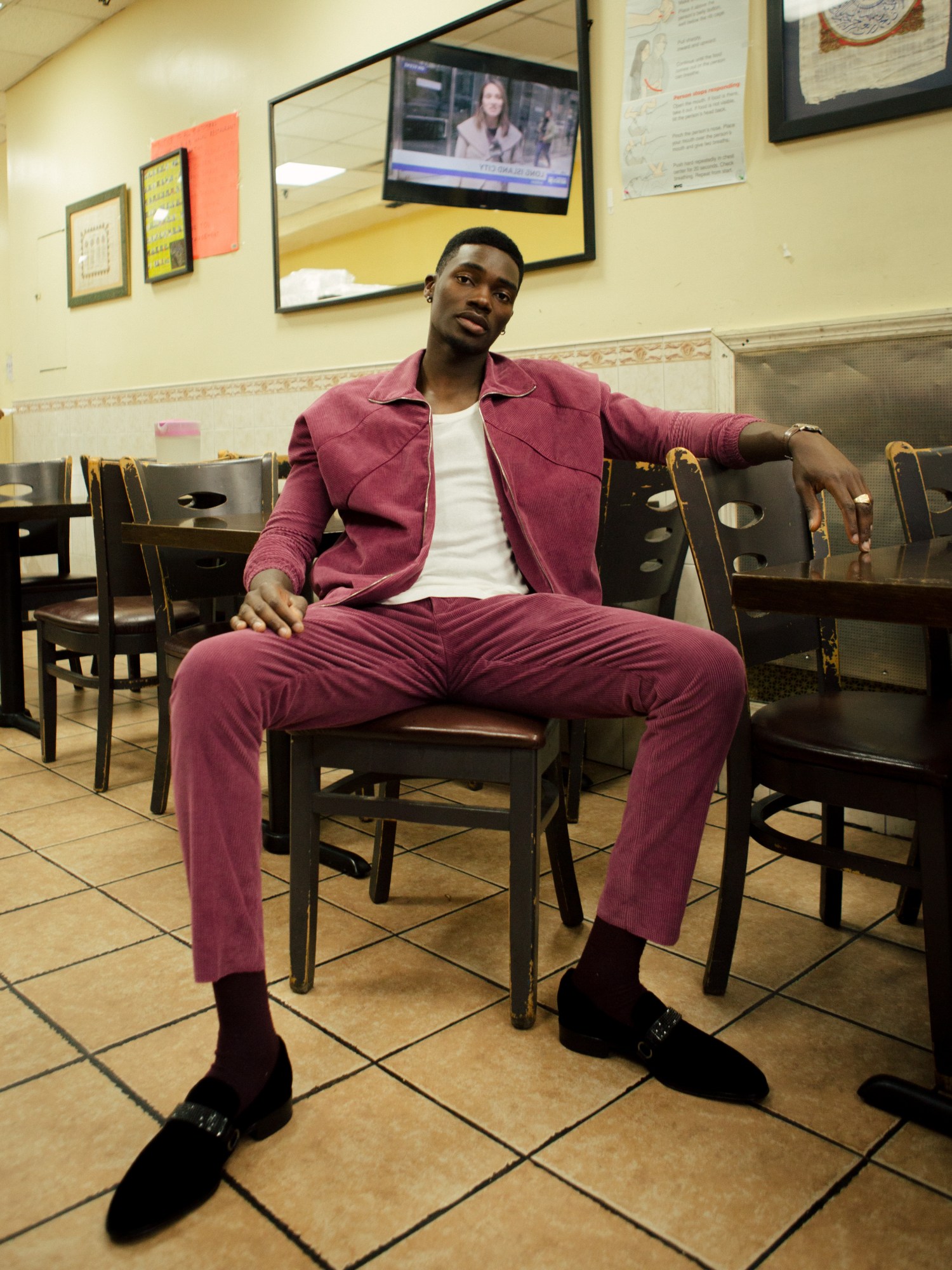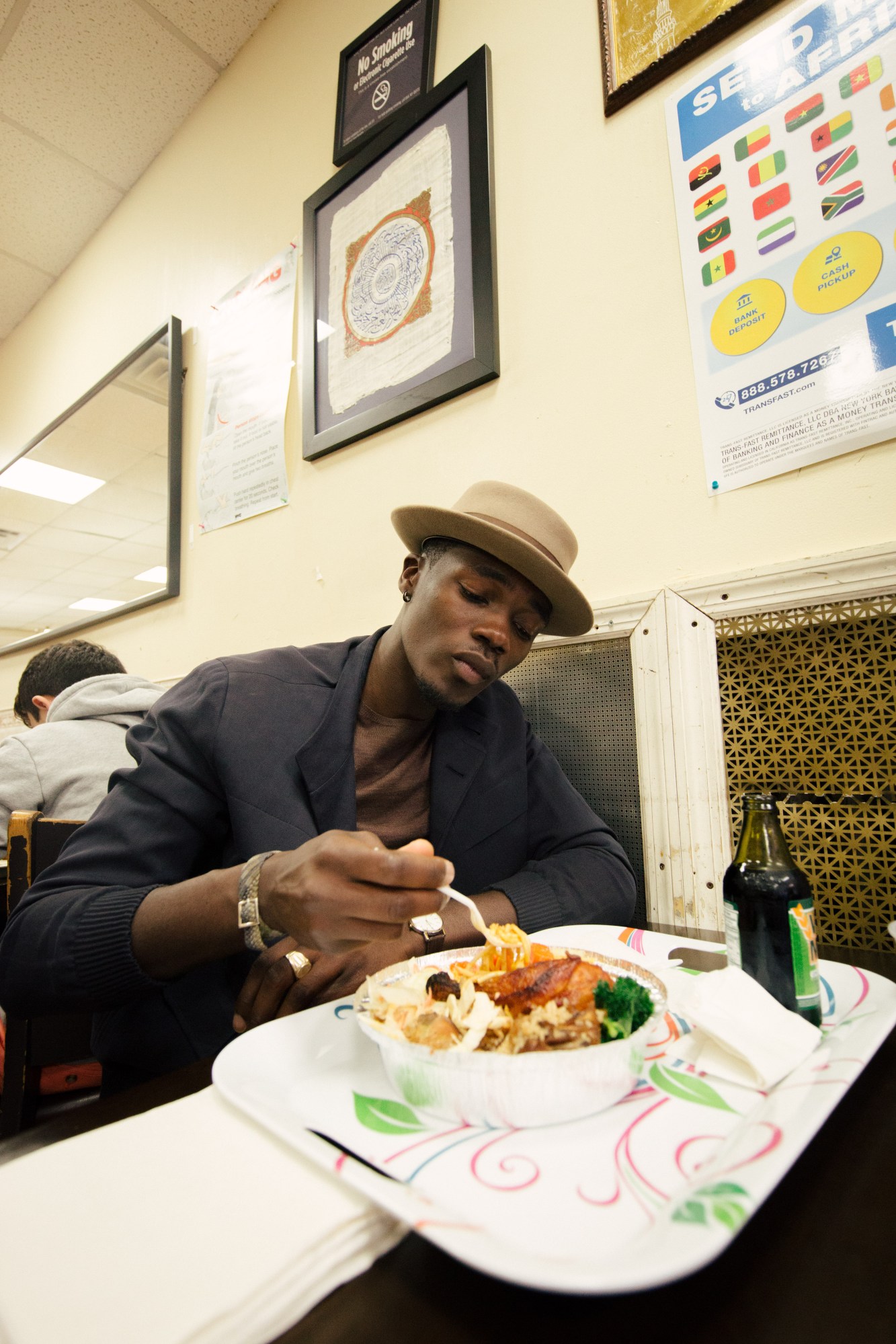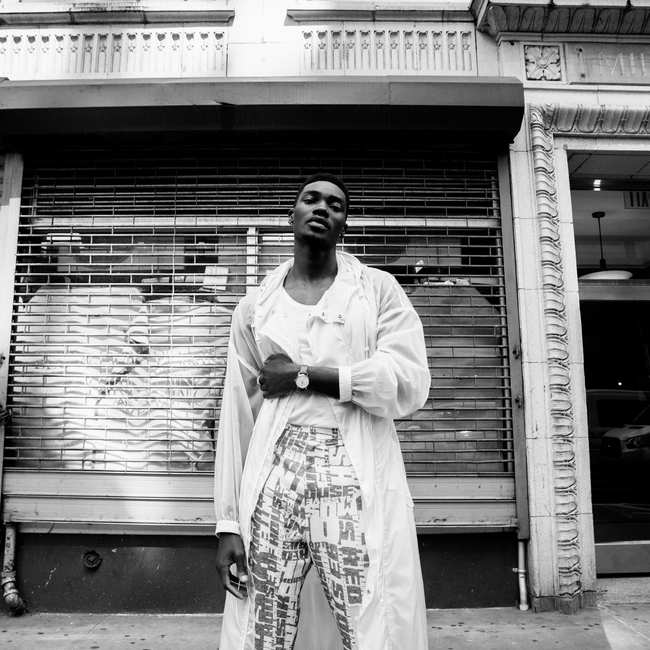Last month, Nigerian-Canadian artist TOBi posed for a photoshoot on the median between the busy intersection of Sixth Avenue and West 26th Street in Manhattan. The 25-year-old soulful singer/rapper was dressed in a formal ankle-length white coat that was intentionally left open to reveal his white shorts — short shorts. Though his publicist insisted he looked godly, he had reservations about the outfit. It was the shorts. They felt unmasculine.
TOBi recognized his discomfort as an opportunity to challenge his idea of what a man should wear. He’s been conscious of how he expresses his masculinity, not just around his clothes, but also through his music. As he created his debut album STILL, available May 3, he worked to make something that modeled a different kind of manhood than the one he grew up with — one of vulnerability, tenderness, and empathy.
Born Oluwatobi Ajibolade in Lagos, Nigeria, TOBi moved to Ottawa, Ontario at age nine with his father. In between takes of a music video TOBi was starring in one week after the short-shorts shoot, he and I (the daughter of Sierra Leonean immigrants) discussed the way the African men we know often struggle to show affection beyond providing for their families. Vulnerability, tenderness, and empathy are not necessarily hallmarks of the traditional West African man.
“When you hug an African man, you can feel their muscles tense,” he said, laughing and mimicking a stiff, uncomfortable embrace in front of a rocky bank of the East River in Williamsburg, Brooklyn. The media images of manhood he consumed weren’t any more emotionally robust, either. “Every action movie, every Rocky, every Commando…every mainstream Western movie that I remember [had] a big and bad man, coming through slaying 100 people,” he says.

But many songs on his debut album feel like a gentle, sonic embrace, particularly of young men, and of himself. STILL does feature songs tinged with romance, like the folky “FEEL” where he sings of “love letters on park benches” and the single “Sweet Poison” where he says his lover “got my heart doing tachycardia” (TOBi has a degree in biology). But throughout the project, there’s a recognition of male reluctance to emote. “Young boys put feelings in a jar/Concealed from the real/To remove from the heart/I’m too grown to be frontin” he spits rapidly on “Shot Me Down,” a song that is as much about fear and pride as it is romantic desire.
On album-openers “Growth” and “City Blues,” in particular, TOBi does extend empathy, showing that he knows that fear and pride are the result of real challenges, particularly for black boys. And throughout STILL, over creeping, soulful instrumentation intermixed with electronic sounds, he sings and raps of incarceration and police violence; of the commodification of black male bodies; of poverty and of grind.
TOBi’s music wasn’t always so gentle; so careful. There’s a clip online of him battle rapping at fourteen, slinging harsh homophobic and sexist slurs at Tory Lanez that he wouldn’t utter at 25.
“That video makes me cringe,” he texted me.
Though he never gave up rap, over time TOBi grew out of that harshness and grew into singing mildly.
“I’ve been singing for just as long [as I’ve been rapping] which no one knew,” he says. “As a teenager that was kind of soft…But on this album, in order to represent myself as truly and as authentically as I could, I wanted to use both methods of expression.”
To build STILL, starting in 2017, TOBi would travel from his homebase in Toronto to Los Angeles about every other month, crashing with his manager. In LA, TOBi was pushed out of his vocal comfort zone by Tim Suby, who urged the singer to reach for the tender, impassioned falsetto that peppers the project. Suby, a producer and composer who has worked with Ariana Grande, Travis Scott, and Jessie Reyez, also helped focus TOBi’s songwriting.
With his rap background, TOBi used to freestyle all his songs, brainstorming hundreds of words until he could hone in on one main idea. Suby encouraged him to work the opposite way, to begin with the album’s themes of boyhood memories and personal growth. “In the songs that we worked on I started from the root concepts, the story, the feeling, the emotion,” says TOBi.
For TOBi, this was a bit of a role reversal, this mentorship. At the age of 18, he started taking on several counseling roles around Toronto, primarily with youth. First he manned a phone line for people experiencing acute emotional crises, then he worked on staff at residential programs for 12-to 24-year-old boys and girls receiving mental health support. TOBi would help them identify and meet goals. Sometimes that would look like finding permanent housing or employment. Often, it would look like sharing self-care strategies that he learned in therapy as a teen, while dealing with depression and anxiety as he tried to navigate two cultures. “Self-love ain’t a joke,” he croons on his track “Growth.”

TOBi sees a lot of himself in the young men he still finds time to work with once a month, even though his music career is taking off. In particular, he sees the resistance to vulnerability.
“It shows up in the language that’s being used, not using words that truly describe how [they] feel. With guys when you ask how they’re doing, it’s like always ‘good,’” says TOBi. “I’ve seen boys who, you know, we’ve built rapport, and they’ll confide something in me that their closest friends have no idea about. Like ‘yo, like, I’m actually feeling really sad about XYZ.’ Imagine carrying that around with you for so long.”
But with his music, TOBi isn’t trying to force anyone into replicating his growth. “I don’t want to be patronizing and be telling people what to do,” he says. And he doesn’t. STILL is deeply personal; deeply reflective of one man’s perspective.
“First and foremost, this album is for me. I wrote this album for me and the younger me,” he says.
But TOBi, who told me by the rocky water’s edge that he can’t help but see things through a social justice lens, seems too altruistic for that to be completely true.
